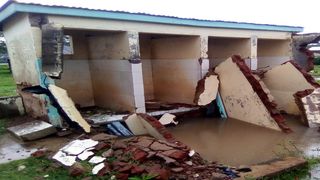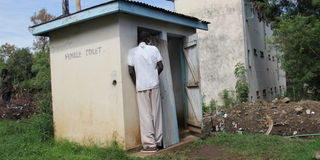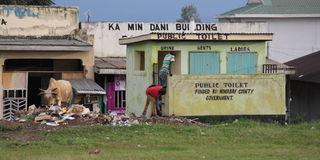
A toilet at Simbi Primary School in Rachuonyo North Sub-county which was destroyed by floods on May 10,2021. Most schools in Homa Bay County do not have enough toilets.
| George Odiwuor | Nation Media GroupHoma Bay
Premium
Call of nature in Ndhiwa? Try the sugarcane plantations
For some residents of Ndhiwa sub-county in Homa Bay County, sugarcane plantations, which cover most of the farmland in the area, are not just an economic venture.
To some, they also come in handy when it comes to answering the call of nature - serving as ‘toilets’, where some go to relieve themselves.
To this group, it is normal to defecate in the open, a situation that has caused conflict between property owners and residents.
The Department of Health in Homa Bay has put Ndhiwa on the radar as one possible spot for disease outbreaks. It is like a time bomb waiting to explode.
Data released by the Ministry of Health shows that Homa Bay is among 15 counties where open defecation is a major public health concern. Others are Baringo, Garissa, Isiolo, Turkana, Samburu and Narok.
Ten percent of the population in Homa Bay defecate in the open, with Ndhiwa sub-county in the lead. A majority of people here, according to findings, defecate in the bush, lake or nearby rivers.
County Public Health and Sanitation Officer James Kabaka says Homa Bay is on the path to becoming an open defecation-free zone, but only if residents collaborate with the government in building toilets in their homes.
The officer said the shortage of toilets contributes to diarrheal infections like cholera and dysentery.
“The county has areas where the environment and water are contaminated because of open defecation. We have warned some families that we will take action against those who do not want to build toilets,” Mr Kabaka said.

A man relieves himself at one of the toilets at Homa Bay County Teaching and Referral Hospital on April 14, 2021. 10 per cent of homes in Homa Bay County do not have toilets. GEORGE ODIWUOR/NATION
Remains a mirage
The problem affects more than homes.
It extends to some public schools in the sub-county where good infrastructure, including modern toilets, remains a mirage.
At Sing’enge Primary School in Kanyamwa Kologi ward, for example, 10 years after the institution was established, learners do not know what modern classrooms look like, let alone modern toilets.
The school, with 350 pupils, has dilapidated infrastructure, including toilets.
Learners prefer relieving themselves in the sugarcane plantations surrounding the school because their latrines have fallen apart.
All classrooms are made of iron sheets. It is difficult to distinguish between doors and windows as all are of the same size and can both be used as entrances and exits.
From time to time, the school would be closed by public health officers over hygiene issues.
Learners at the school can, however, breathe a sigh of relief after former Kasipul MP Oyugi Magwanga, in collaboration with Global Partners, built four modern toilets for learners and teachers.
Mr Magwanga said the lack of toilets in most public schools in Homa Bay remains a great health challenge.
"Sing’enge Primary has dilapidated infrastructure just like most schools in the county. Their wish was for us to help them put up a new classroom. But we resolved to build modern toilets because they are more important," he said when he commissioned the toilets for use last week.
According to stakeholders, Ministry of Health officials would often clash with the school management over poor hygiene standards and lack of toilets.
The toilets are filled up to the brim.
"Good education can only be achieved if learners are healthy," the former MP said.

Children playing next to a public toilet that is also next to a garbage site in Ndhiwa Town in Homa Bay County. GEORGE ODIWUOR/NATION
Shortage of latrines
Similar initiatives are being implemented throughout the county, with institutions like Lake Primary and Homa Bay Primary in Homa Bay town among the beneficiaries.
But there are still many primary schools suffering from a shortage of latrines.
Mr Kabaka, the sanitation officer, said that if all schools were forced to have the recommended number of latrines, most learning institutions in the county would be closed.
He said 30 boys in a school should share one toilet while a similar facility should be used by at least 25 girls.
If schools fail to achieve this, they would be closed.
“There is a recommended ratio of the number of pupils who should use a toilet. It is not advisable for many children to share the same toilet,” he said.
The department of health, he said, has cautioned schools that do not have enough lavatories.
Mr Kabaka said Unicef recently began a programme to help schools build better latrines that are safe and enough for every child.
Some 30 primary schools in Rangwe and Homa Bay sub-counties with inadequate latrines were identified to benefit from the programme.
Education officials in Ndhiwa have also acknowledged the challenge saying the shortage of latrines in schools affects concentration in class among children.
Sub-county Education Director Daniel Anekaya said some schools in Ndhiwa have latrines that are used by both boys and girls.
“Some pupils tend to avoid school because of the condition of the latrines. This affects … retention. We have asked schools that have challenges in sanitation facilities to reach out for help,” he said.
The main problem affecting Ndhiwa, he said, is the type of soil in the area and the topography of the region, which make it easier for runoff in rainy seasons to fill up the pits used as toilets.
The Education ministry has begun training school management committees in Ndhiwa on good sanitation.





